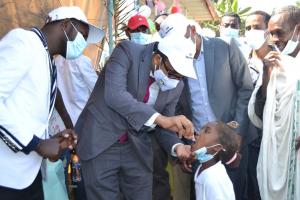Ethiopia conducts an oral cholera vaccination campaign to protect populations in cholera affected districts
Addis Ababa – An oral cholera vaccination (OCV) campaign, launched to protect at risk populations in active cholera woredas (districts) in Gambella, Oromia, SNNP, Sidama and Somalia regions, has just been completed. The campaign, which aimed to vaccinate 1.67 million people aged one year and above, was conducted in 20 woredas, achieving 97.3% coverage.
“With the leadership of the EPHI and collaboration of partners, the campaign was conducted successfully despite the challenges posed by the COVID-19 global pandemic, which has taken up the attention of health workers and the public,” said Dr Aggrey Bategereza, the WHO Ethiopia Emergency Preparedness and Response Lead. “Both the public and the vaccinators displayed commendable commitment to the success of the campaign,” he added.
Since the start of the cholera outbreak in April 2019, 18,298 cases and 322 deaths have been reported across the country with ongoing transmissions in Gambella, Oromia and SNNP regions. Under the leadership of the Ethiopian Public Health Institute (EPHI), response measures have been put in place by multi-sectoral stakeholders to interrupt transmission. House to house disinfection, water testing and treatment and latrine construction were undertaken alongside risk communication and community engagement to promote healthy behaviors and stop risky practices such as open defecation. Active case search and case management were also actively implemented.
It was together with these preventive and control measures that an OCV campaign was conducted to interrupting transmission and brining the outbreak under control.
WHO surveillance teams worked with the government public health emergency management (PHEM) teams to detect the outbreak and initiate plans for timely response back in April 2019 when the outbreak started. WHO was part of the rapid response teams (RRT) that were deployed to respond to the outbreak. WHO teams in the affected regions provided technical support to the outbreak response in WaSH, risk communication and case management.
The teams trained vaccinators as per WHO OCV guidelines, and provided supportive supervision to ensure quality campaign implementation. WHO also facilitated the country request for vaccines to the International Coordination Group on Vaccine Provision (ICG) through the GAVI Vaccine Alliance, and provided logistics support to the campaign.
In line with the Global Roadmap to Eliminate Cholera by 2030, and as part of the national cholera elimination strategy, OCV campaigns are conducted in affected and surrounding woredas/districts following outbreaks of cholera. This helps stop disease transmission, while the intersectoral response teams work to improve water safety, and educate the public on good sanitary and hygiene practices.
Cholera is an acute diarrhoeal infection caused by eating or drinking food or water that is contaminated with the bacterium Vibrio cholerae resulting in severe acute watery diarrhoea with severe dehydration. It takes between 12 hours and 5 days for a person to show symptoms after consuming contaminated food or water. Cholera affects both children and adults and can kill within hours if untreated, but early detection, fluid replacement with oral rehydration solutions or intravenous fluids can save lives.
WHO, UNICEF, Transfrom PHCU and International Rescue Committee (IRC) collaborated with the EPHI and regional health bureaus in the vaccination campaign.
A second round campaign for the same target districts is in plan and a request for 1,677,138 oral cholera vaccine doses has already been submitted to the ICG.



